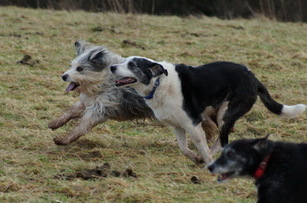My approach to training and behaviour

My basis for my work with dogs is the knowledge gained from scientific research in species-specific behaviour, and the application of the psychology of teaching and learning to dog training. When we have a clear understanding of the natural behaviour of the animal we are working with, combined with a knowledge of the underlying initiating factors and motivations for a behaviour, and the variables that maintain it, ‘problem behaviour’ becomes far less mysterious and much more understandable and manageable.
Over the years, it has become very clear to me that there is no need to force or coerce dogs into behaving in ways we would like – in training generally, and when dealing with problem behaviour specifically, the less we rely on punishment, and the less stress we place on the dog concerned, the more effective our approach will be.
Over the years, it has become very clear to me that there is no need to force or coerce dogs into behaving in ways we would like – in training generally, and when dealing with problem behaviour specifically, the less we rely on punishment, and the less stress we place on the dog concerned, the more effective our approach will be.
When I am working with people and dogs, always at the forefront of my mind is safety, a calm atmosphere, effectiveness, and an enjoyable experience for all. Most of all, I want to help owners to be able to understand and respond to their dogs – to develop insight into their dog’s behaviour, and to acquire the knowledge and techniques to change behaviour that is detrimental to the dog’s lifestyle, and the human-dog relationship.
Problem behaviours that I see dogs for include:
* Please note that I no longer see cases of dog to dog aggression/on lead reactivity to other dogs due to the loss of my own dogs who worked these kinds of cases with me for many years.
Problem behaviours that I see dogs for include:
- Aggression towards people*
- 'Dominance'
- Toilet training problems
- Mouthing and biting
- Separation anxiety
- Fears and phobias (could be of people, dogs, other animals, or certain situations).
- Chewing and/or destroying objects
- Copraphagia
- Excessive barking
- Over-excitability/uncontrollable behaviour
- Resource guarding
- General training issues
* Please note that I no longer see cases of dog to dog aggression/on lead reactivity to other dogs due to the loss of my own dogs who worked these kinds of cases with me for many years.

Many behavioural and training problems can stem from incorrect management, illness or pain. All these factors will be taken into account when I work with owners to overcome their pet’s problems. Of course, there is no ‘magic cure’ for a training or behavioural problem – I don’t subscribe to ‘quick fixes’ and, as already stated, I seek to minimise stress and aversive experiences for the animal as much as possible.
'Problem' behaviour has multiple causes, including genes, early experiences (including even experiences in the womb), environment, the kinds of training techniques that have been tried, management practices and so on. When working with such complex variables there can be no absolute guarantee that a behaviour problem will be ‘solved’ – the reality for some may be a combination of understanding, improvement and management.
Behaviour is complex, and there can be no guarantees that a behavioural problem can be ‘cured’, but generally speaking, with understanding, knowledge, skills, support, time and effort, situations can be greatly improved. There are no worthwhile ‘quick fixes’ in the world of dog behaviour and training, but the correct knowledge and approach can greatly improve matters.
Force, no matter how well disguised, begets resistance.
Lakota proverb
'Problem' behaviour has multiple causes, including genes, early experiences (including even experiences in the womb), environment, the kinds of training techniques that have been tried, management practices and so on. When working with such complex variables there can be no absolute guarantee that a behaviour problem will be ‘solved’ – the reality for some may be a combination of understanding, improvement and management.
Behaviour is complex, and there can be no guarantees that a behavioural problem can be ‘cured’, but generally speaking, with understanding, knowledge, skills, support, time and effort, situations can be greatly improved. There are no worthwhile ‘quick fixes’ in the world of dog behaviour and training, but the correct knowledge and approach can greatly improve matters.
Force, no matter how well disguised, begets resistance.
Lakota proverb
